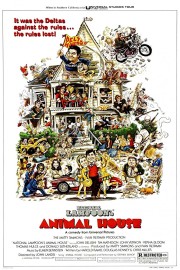National Lampoon’s Animal House
When it comes to a lot of the classic cinematic comedies of my generation, I either still haven’t seen it, or didn’t come to it until I was an adult. Because my film love didn’t really hit until high school and college, I’ve had a lot of catching up to do. My mother is the reason I first watched John Landis’s “Animal House,” and while it hasn’t been a film that is among my favorites, it’s one of those films you never really forget watching. It is a legitimate classic while also pointing ahead to the anarchic comedy tone that would come to dominate movie comedies in the decades to come.
The first film to be released under the National Lampoon banner was one of the films that set the “snobs vs. slobs” template that comedy would mine for the next 40 years as Faber College sees all out war waged on campus by the rowdy Delta fraternity, especially against the more traditionally uptight Omega frat and Dean Wormer (John Vernon), who is just looking for an excuse to get rid of the Deltas. Our entry point into Faber are the freshman pledges Larry Kroger (Tom Hulce) and Kent Dorfman (Stephen Furst), and as they start looking at which frat to pledge to at the beginning, we get to see the rest of the cast of characters from there, and believe me, people like John Blutarsky (John Belushi), Doug Neidermeyer (Mark Metcalf) and Eric Stratton (Tim Matheson) are quite the characters.
I’m coming in late to John Landis’s heyday, and a lot of more beloved films (I just watched “American Werewolf in London” last year), but it’s easy to see why he had the impact he did on cinema, and especially, comedy. “Animal House” is controlled chaos from Landis that is also pretty damn funny, which is a credit to the screenplay he is working from by Harold Ramis, Douglas Kenney (who plays Stork) and Chris Miller, as well as the cast they put together, many of whom were just getting started. Nobody got a bigger bounce from “Animal House” than “Saturday Night Live” veteran John Belushi, but it’s funny how, watching the time removed from its impact (and in the wake of so much of its legacy), Bluto feels downright tame, and honestly, I don’t even know if he’s the funniest performance in the film. I get why Belushi was the breakout star here- he is an agent of chaos, and could deliver a wild moment without breaking a sweat- but he really isn’t much of a character. He’s a scene-stealer, and it’s fascinating to realize that watching it when many of the biggest moments you remember from the film belong to Belushi. If I had to pick the funniest actor in “Animal House,” it would be Metcalf’s Neidermeyer, with a stick so far up his ass that his bullying attitude is hilarious to watch; he earns what happens to him in the “where is he now?” comment at the end of the film.
The film is set in 1962, and you get the feeling that Ramis, Kenney and Miller are all pulling off of their own experiences in college as they invent the cliches that will become staples for everything from “Fast Times at Ridgemont High” to “American Pie” to “Accepted.” You also wonder how much of this is goosed up for comedic effect vs. being honest to God honesty. The interpersonal stuff, including Larry trying to lose his virginity and Stratton being a major bullshit artist to get dates for the guys and the interactions between Donald “Boon” Schoenstein (Peter Riegert) and Katy (Karen Allen) all feel like genuine stuff, although it wouldn’t surprise me if stuff like Bluto’s peeping tom routine from a ladder and the horse in Dean Wormer’s office have some basis in fact, as well (although I would hope the horse didn’t die of a heart attack, though). The climax feels the most out of absurdity left field, but that makes sense because it feels as though the beginning of the sequence was inspired by the JFK assassination conspiracy, which no, didn’t have Oliver Stone’s cinematic flair involved with its myth yet, but the conspiracy had already begun to take hold, and it feels as though Landis played into the myth to come.
There’s a lot that I really like about this movie- the guys ending up in an all-black bar; every moment with Neidermeyer; Bacon’s Chip Diller at the end; the horse in Wormer’s office; the score by Elmer Bernstein; Donald Sutherland’s wonderfully spacey Professor Jennings; and the toga party. If I don’t exactly love it, it’s only because I might be coming at it too far removed from the perspective of discovering it myself. I’m definitely glad I own it, though, and can revisit it when I want.










